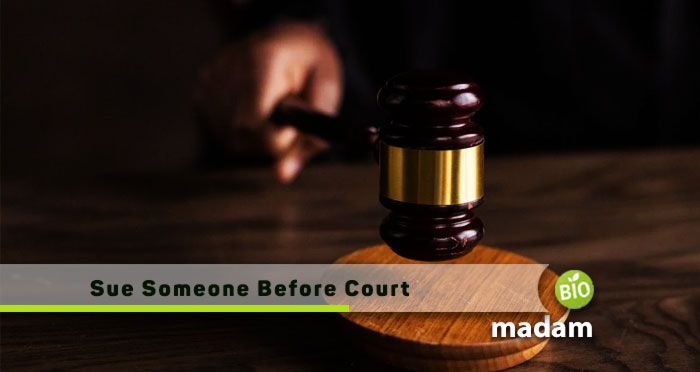Have you suffered an injury at the hands of someone else? Are you considering taking legal action against them to seek compensation for your damages? If so, you may be wondering how to sue someone before a court of law. While it can seem daunting and overwhelming, this process is actually fairly straightforward when you have the right guidance and knowledge. It’s important to understand the fundamentals of filing a lawsuit so that you can make an informed decision about how to proceed. Here are some key steps to consider when suing someone over an injury.
Why Do You Need a Lawyer?
First and foremost, personal injury lawsuits can be complex legal matters that require expertise in the law. A qualified attorney can navigate the nuances of your case and help you understand your legal rights and options. Another reason to hire a lawyer is that they can handle all aspects of your case on your behalf, from gathering evidence to negotiating with insurance companies. This takes a lot off of your plate and allows you to focus on recovering from your injuries. For example, a personal injury lawyer can help you collect the relevant medical records, police reports, and other documents necessary to prove your claim. Having a lawyer by your side increases the likelihood of success in court. An experienced attorney knows how to present evidence effectively and argue persuasively for their client’s interests. Hiring a lawyer is essential when pursuing legal action after an injury. With their guidance and support, you’ll have the best chance of receiving fair compensation for the damages caused by someone else’s negligence or misconduct.
What is a Lawsuit?
A lawsuit is a legal proceeding initiated by one party against another in order to resolve a dispute. It’s also known as litigation and can involve various types of cases such as personal injury, breach of contract, or property disputes. The process starts with the plaintiff filing a complaint that outlines the details of their claim and why they believe they’re entitled to damages. The defendant then has an opportunity to respond, either admitting or denying the allegations made against them. If both parties cannot reach a settlement outside of court, then the case will proceed through various stages including discovery, where each side gathers evidence and information from witnesses; mediation, where a neutral third party tries to help both sides come to an agreement; and finally trial. During the trial, both sides present their arguments and evidence before a judge or jury who ultimately delivers a verdict. If the plaintiff wins the case, they may be awarded damages that compensate for their losses resulting from the incident that led them to pursue legal action.

Who can you Sue?
When it comes to suing someone over an injury, the question of who can be sued is a common one. In general, anyone who was involved in causing your injury can potentially be held liable. This includes individuals, businesses, organizations, or even governmental entities. For example, if you were injured in a car accident caused by another driver, you may be able to sue that driver for damages. Similarly, if you slipped and fell at a grocery store due to their negligence in maintaining safe premises, you could potentially sue the store owner. It’s worth noting that sometimes multiple parties can share liability for an injury. For instance, if a product malfunctioned and caused harm – both the manufacturer and seller could potentially face legal action. Ultimately though determining who exactly should be sued will depend on the specific circumstances surrounding your injury case. It’s best to consult with an experienced personal injury lawyer who can help guide you through this process.
What do you Need to Prove in Court?
When you sue someone over an injury in court, it is not enough to simply claim that they caused your injuries. You need to provide evidence and prove certain things in order for the court to rule in your favor. Firstly, you must establish that the person you are suing owes you a duty of care. This means they had a responsibility to act with reasonable care towards you and prevent harm from occurring. Secondly, you must show that this duty of care was breached by their actions or lack of action. You will need to demonstrate how their behavior fell short of what is expected of them under the circumstances. Thirdly, it is essential to prove that this breach directly caused your injuries. This means showing a clear link between their actions and the harm suffered by yourself. Damages must be shown – monetary compensation for any losses incurred as a result of injury including medical bills or lost wages due to time off work etc.
How Much Does it Cost to Sue Someone?
Suing someone can be an expensive process, and it’s important to understand the costs involved before deciding to pursue legal action. The cost of suing someone varies depending on a variety of factors such as the complexity of the case, location, and attorney fees. One significant cost is attorney fees. Most lawyers charge by the hour and rates vary widely depending on their experience levels. In some cases, attorneys may agree to take your case on contingency which means that they will only get paid if you win your lawsuit. Another factor that affects the cost is filing fees. Filing a lawsuit requires paying court filing fees which vary based on location and type of lawsuit being filed.

To sum up, suing someone over an injury can be a complex and daunting process. It is important to understand the legal system, what you need to prove in court, and the costs involved before making any decisions. While hiring a lawyer may seem like an added expense, it can greatly increase your chances of winning your case. However, there are alternative methods such as mediation or arbitration that may be less expensive and time-consuming. Ultimately, the decision to sue someone should not be taken lightly. It is important to weigh all factors carefully before proceeding with legal action. By understanding the process thoroughly and seeking professional guidance when necessary, you can ensure that justice is served.

Hi, they call me Jenna, and I am also known for achieving a gold medal during my Ph.D. in science life. I always had a dream to educate people through my utmost writing hobby. So, I chose this blogging path, and Biomadam gave me this opportunity to present for them. I now stand to entertain you. Continue reading my articles & discuss if you’ve any confusion through the comment section below.

